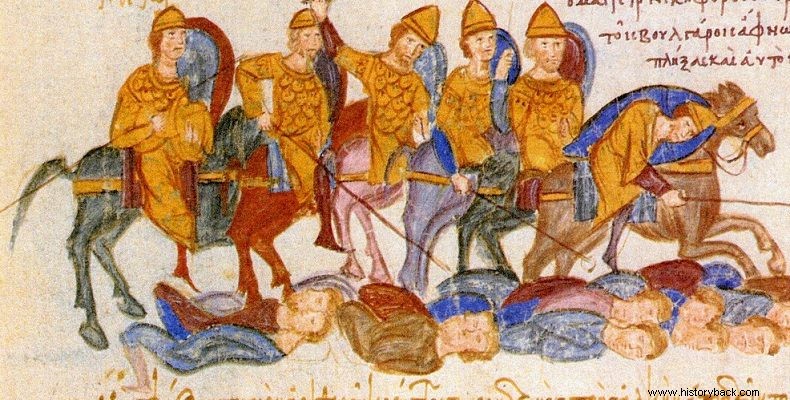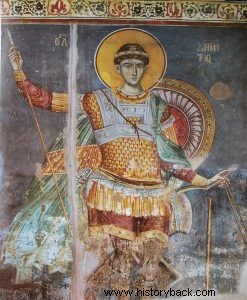
In 1040, Bulgaria was a province of the Byzantine Empire, after its subjugation by Vasilios Bulgarokdonos. However, this year the noble Petros Deleanos, who had, in theory, become Hellenized, left Constantinople and fled to Belgrade, from where he declared a revolution against the empire, proclaiming himself the grandson of Tsar Samuel.
Deleanos, as was his real name, was given the name Peter – after the canonized Bulgarian tsar of the same name. The revolution quickly spread and the Bulgarians slaughtered as far as Thebes. The success of Deleanus as caused the interest of Alousianus, nephew of Tsar Samuel, who hastened to join the revolutionaries with the prospect of still claiming the Bulgarian throne.
In the meantime, Deleanos, after getting rid of another would-be claimant, Tihomir, had advanced and defeated the Byzantines, under the late emperor Michael IV Paphlagona, outside Thessaloniki, occupied Durrës and created an extensive state which it stretched from present-day Serbia to Corinth, controlling western and central Macedonia, present-day Albania and Epirus.
When Alucianus appeared before Deleanus the latter could not so easily exterminate him as Alucianus was a true descendant of Samuel's Bulgarian dynasty. So instead of exterminating him, he thought of sending him to capture Thessalonica, the second city of the Empire. Aleutian at the head of 40,000 men did indeed move, in October 1040 AD. against the Macedonian capital. Alusian indeed moved towards the city and without resting his army. The Bulgarians deployed their forces for a siege.
The "siege" lasted only six days. On the evening of the sixth day, the Byzantines, led by the governor of the city, Konstantinos, after an all-night prayer to the city's patron Saint Demetrius - whose memory is commemorated on October 26 - as the sources state, made a surprise exit defeating the enemies who panicked and tried to save themselves. The chronicler of the time Georgios Kedrinos and also Ioannis Skylitzis report that the Byzantine exodus was led by the saint himself, on horseback.
"At that time there came from the city of Thessalonica, Konstantinos Patrikios, the king's nephew, who had arrived and carefully surrounded the trench, and had the siege. On the other hand, tempted by the city, he was slow and lazy and repulsed everywhere, and they were endlessly waiting for him to attend to the student. On one of the days, the villagers came to the tomb of the great martyr Demetrius, and having prayed all day and were anointed with the myrrh that flowed from the holy tomb, as if in a rush they threw open the gates and came out against the Bulgarians.
"Together with the Thessalonians the order of the Megathymos. Having come out, and surprised by the unexpected, they put the Bulgarians to shame, not at all for defense or fortifying, the martyr leading the Roman army and the one who had normalized the march, as the captured Bulgarians affirmed in unison, saying that a young man on horseback had seen a Roman phalanx ahead of him, hence the fire inflaming the adversaries. After more than fifteen thousand fell, none of these were taken without patrols. And the rest, together with Alousianos towards Deleanon, are saved", reports Skylitzis.
At least 15,000 were killed in battle and as many were captured. The rest fled disorderly. Alousianos, in order to escape, gave up even his armor and returned humiliated to the camp of Deleanus. It was only natural that the two men's relations would be disturbed. Alousianos, fearing for his head, decided to move first. So he invited Deleanus to a banquet and there he attacked him and blinded him. Blind, Deleanos continued the war but was eventually captured and probably executed.

